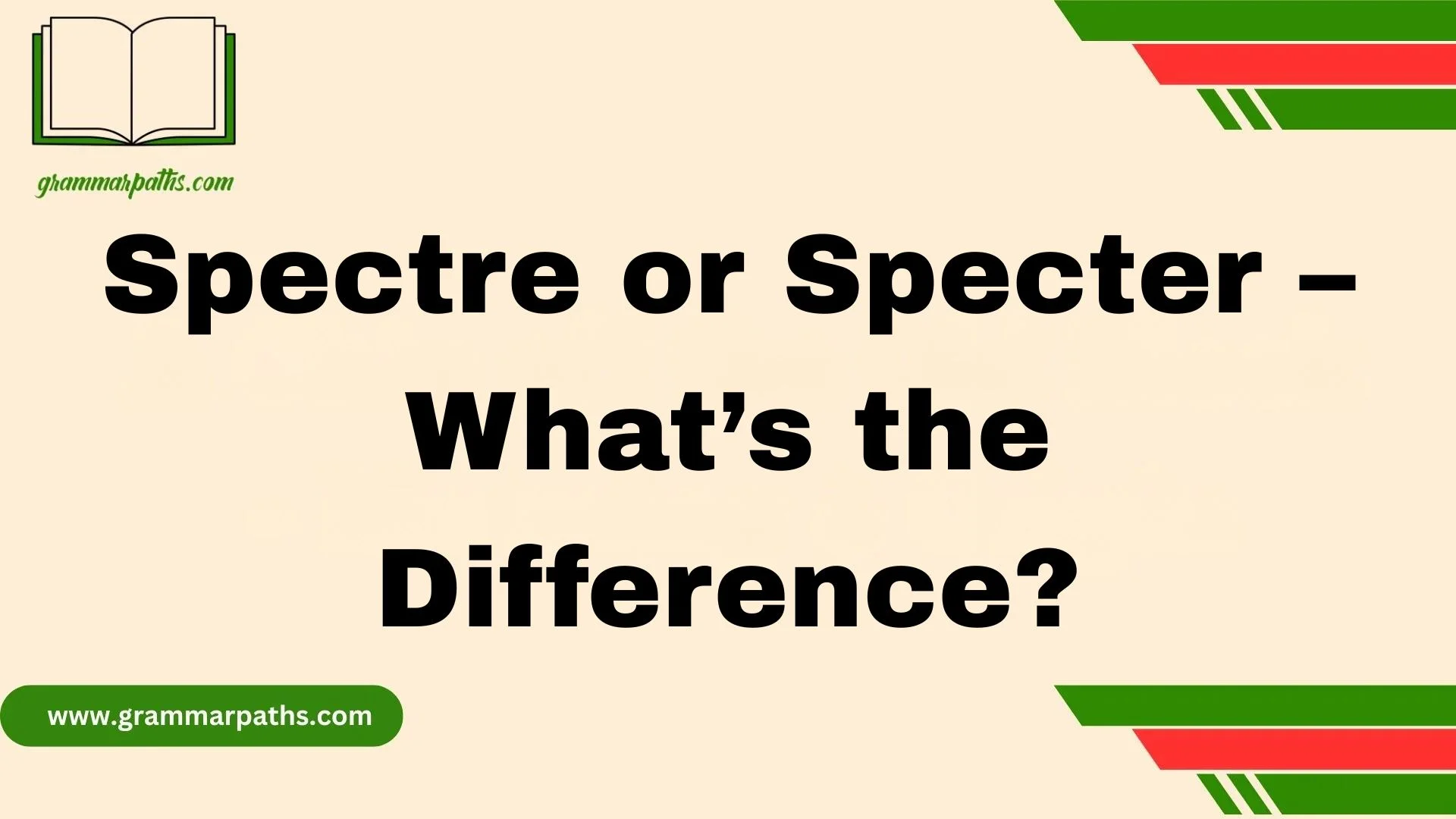In the ongoing debate of Spectre or Specter – What’s the Difference?, both versions reflect cultural nuances, stylistic tone, and historical evolution—British and American English diverge not only in spelling but in emotional implication and interpretation of the word.
From ghosts, phantoms, and shadows in literary thrillers to subtle psychological tones in academic writing, the difference is more than regional—it’s deeply rooted in language, expression, and etymology. Authors, editors, and readers navigate these alternate spellings based on dialects, grammar, and clarity of their audience, especially across movies, books, and other creative forms where style and mood matter.
Both spellings carry an emotional, supernatural weight—from the eerie, haunting presence of spirits and demons to the subtle nuances of human fear and psyche, reminding us how usage, evolution, and interpretation shape the appearance and expression of a word globally.
The Short Answer – Spectre vs Specter
Let’s start simple.
Both specter and spectre mean the same thing:
- A ghost or phantom
- A looming threat or fear (as in “the specter of war”)
The only real difference is regional spelling:
| Spelling | Region | Usage Example |
| Specter | American English | “The specter of inflation looms.” |
| Spectre | British English | “The spectre of death haunted him.” |
So if you’re writing in the United States, use specter. If you’re writing for a British audience, go with spectre.
Where Did These Ghostly Words Come From?
Latin & French Roots
Both words go back to the Latin word spectrum, meaning appearance, vision, or image. Latin gave rise to the French word spectre, which directly means ghost.
When English absorbed the word from French in the 1600s, it brought along the French spelling—spectre.
But things changed in America…
Noah Webster’s Spelling Revolution
In the early 1800s, American linguist Noah Webster (yes, the guy behind Webster’s Dictionary) made it his mission to simplify American spelling.
His belief: “Let’s make English more logical.”
So he dropped unnecessary letters:
- Colour → Color
- Theatre → Theater
- Spectre → Specter
Webster’s influence stuck. That’s why the spelling “specter” dominates in the United States today.
American English: Why ‘Specter’ Took Over
In American English, “specter” is not only standard—it’s the only correct spelling in most formal contexts.
You’ll see “specter” used in:
- U.S. government documents
- Legal cases
- Newspapers and journals
- Textbooks and educational material
For example:
- “The specter of cyberattacks has become a national concern.” — New York Times
- “We face the specter of recession.” — Wall Street Journal
Want proof? According to Google Books Ngram Viewer, “specter” appears nearly 10 times more than “spectre” in American literature after 1900.
In the U.S., “specter” is king.
British English: Why ‘Spectre’ Still Haunts the UK
In contrast, British English sticks with the original “spectre.”
It’s the version used in:
- British newspapers like The Guardian and The Times
- British novels (think Dickens, Orwell, Rowling)
- UK education systems and literature curriculums
Example from British media:
- “The spectre of economic collapse looms large.” — The Independent
The UK prefers to maintain ties to older spellings with French or Latin roots. That’s why you’ll also see honour, analyse, organise, and defence over their American counterparts.
The Meaning Behind the Word: Literal vs Figurative Use
These two spellings may be interchangeable, but the meaning of the word remains consistent—and it’s often deeper than just “ghost.”
Literal Meaning: A Ghost or Phantom
This is the classic usage:
- A ghostly figure
- A supernatural being
- A haunting spirit
Examples:
- “He claimed to have seen a specter in the attic.”
- “The old mansion was said to be haunted by a spectre.”
This usage is common in horror films, Halloween stories, and gothic novels.
Figurative Meaning: A Threat or Ominous Presence
Sometimes “specter/spectre” refers to a looming danger or unwelcome possibility—something abstract but frightening.
Common expressions:
- “The specter of nuclear war”
- “The specter of unemployment”
- “The specter of climate change”
This usage appears often in politics, economics, and global news.
Spectre and Specter in Pop Culture
Here’s where things get fun. These words appear everywhere in pop culture—and often, the spelling aligns with the country of origin.
James Bond: SPECTRE (UK)
In the James Bond universe, SPECTRE stands for:
Special Executive for Counter-intelligence, Terrorism, Revenge and Extortion.
It’s the evil organization behind several Bond villains. Created by British author Ian Fleming, it uses the UK spelling—Spectre.
Example:
“Spectre (2015)” is the 24th film in the Bond franchise.
DC Comics: The Specter (US)
In DC Comics, The Specter is a powerful supernatural character. A ghostly spirit of vengeance, often portrayed as unstoppable and godlike.
First appearance: More Fun Comics #52 (1940)
Publisher: DC Comics (United States)
Video Games and Anime
- Call of Duty: Spectre – A stealth assassin class in the Black Ops series. Spelled “Spectre” in UK releases, but “Specter” in US.
- Destiny 2 – The floating AI companions are called “Ghosts,” but fan-made mods and character names often use both spellings.
- Mass Effect – The elite galactic agents are called “Spectres”—again, UK spelling used intentionally for style.
Visual Comparison: How Usage Breaks Down
Let’s compare the usage of “specter” vs. “spectre” using search trends, literature, and media:
| Source | Spelling Used | Notes |
| U.S. News Media | Specter | NYT, WSJ, CNN use “specter” exclusively |
| British Novels | Spectre | J.K. Rowling, George Orwell use “spectre” |
| Google Trends (US) | Specter | Consistently ranks higher |
| Google Trends (UK) | Spectre | Dominates British search volume |
| Hollywood Films | Mixed | “Spectre” for Bond, “Specter” in horror |
| Academic Journals | Specter | APA, MLA prefer US spelling in U.S. papers |
Other Words with US vs UK Spelling Differences
If you’ve ever seen color spelled as colour or organize as organise, you’ve already encountered the split between American and British English.
Here are some common examples:
| American English | British English |
| Color | Colour |
| Theater | Theatre |
| Center | Centre |
| Analyze | Analyse |
| Defense | Defence |
| Catalog | Catalogue |
| Specter | Spectre |
These aren’t typos—just regional preferences.
Writing Tips: Which One Should You Use?
Here’s what matters most: your audience.
- Writing for Americans? Use specter
- Writing for Brits or global readers? Use spectre
- Writing for academic work? Follow your style guide (APA, MLA, Chicago)
Pro Tip for Writers & Editors:
Consistency is key. Once you choose a spelling, stick with it throughout the piece. Mixed spelling looks careless.
AI Tools and Grammar Checkers
Tools like Grammarly, ProWritingAid, and Microsoft Editor will suggest the correct version based on your region settings.
How to Remember the Difference (Without Overthinking It)
Mnemonic Trick
Think of this simple phrase:
“Specter centers in America.”
That’s right—“specter” and “center” both use the -er ending and are American spellings.
Another tip:
“Specter haunts America. Spectre haunts the UK.”
Still confused? Use spell-check tools or style guides to double-check.
Fun Fact Corner: Specter in American Politics
Senator Arlen Specter
Yes—“Specter” was a real last name. Arlen Specter was a U.S. Senator from Pennsylvania who served from 1981 to 2011.
His name sparked interest in the word, especially among younger voters curious if it had a ghostly meaning. (It didn’t—it was just his surname.)
The Specter of Communism
In political history, the phrase “The specter of communism” was used in the Communist Manifesto by Marx and Engels.
Later, U.S. Presidents and politicians repurposed the phrase during the Cold War to warn of “the specter of Soviet influence.”
FAQ – Quick Answers About Specter vs Spectre
What is the difference between spectre and specter?
Both spellings are correct and mean the same thing. “Spectre” is used in British English, while “specter” is the preferred form in American English.
Do spectre and specter have the same meaning?
Yes, they both refer to a ghost, phantom, haunting presence, or a supernatural entity. The difference is purely in regional spelling conventions.
Where is “spectre” more commonly used?
Spectre is more common in British English, especially in literature, journalism, and formal writing in the UK, Canada, and other Commonwealth countries.
Where is “specter” more commonly used?
Specter is widely used in American English, especially in modern novels, media, and psychological thrillers produced in the U.S.
Is there a contextual difference in their usage?
Sometimes. “Specter” might be used in psychological or symbolic contexts to represent fear or emotion, while “spectre” often retains a poetic or classical tone in literature.
Can both spellings be used in formal writing?
Yes, both are acceptable in formal writing. Just ensure consistency—stick to one version based on your audience’s regional spelling (American or British).
Did Noah Webster influence the American spelling “specter”?
Yes. Noah Webster, the American lexicographer, promoted simplified spellings like specter during his 19th-century reform of American English.
Are there stylistic differences in literature or media?
Yes. For example, “Spectre” is used as the name of the criminal organization in the James Bond series, giving it a distinct and stylized identity.
What are some common synonyms for spectre or specter?
Common synonyms include: ghost, phantom, apparition, spirit, shade, wraith, and shadow.
Why is it important to know the difference?
Understanding the difference improves writing clarity, helps match your language to your audience, and enhances stylistic accuracy in both creative and academic contexts.
Conclusion
The words spectre and specter might seem like simple spelling variations, but they reveal much more than just regional preferences. Rooted in centuries of literary tradition, these terms have evolved through language, culture, and geography, with British English favoring spectre and American English leaning toward specter. Yet, both share identical meanings—whether in the form of a ghost, a haunting presence, or a metaphorical shadow in human emotion or literature.
From academic writing to thrillers, from etymology to style, the choice between the two depends on your audience, tone, and context. Understanding these nuances not only improves clarity in your writing but also enriches your grasp of how language evolves. So whether you’re haunted by a ghostly figure or just editing a manuscript, remember: both spellings are correct—you just need to pick the one that best fits your voice and your readers

Mia Rose is the passionate writer and founder of GrammarPaths.com, a resource dedicated to helping learners master English grammar, idioms, and writing skills with ease. With a deep love for language and years of experience in teaching and content creation, Mia simplifies complex grammar rules into clear, practical guides that readers can instantly apply.












